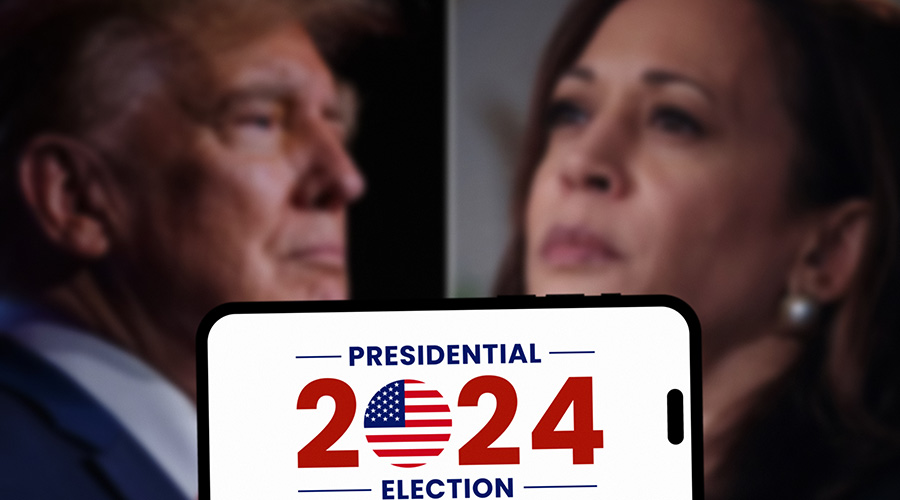
2024 Presidential Election: Kamala Harris and Donald Trump's Stance on Facility Management Issues
The upcoming presidential election will have an impact on the facilities management industry. October 30, 2024
By Mackenna Moralez, Associate Editor
The United States is gearing up for a historical election next week as current Vice President Kamala Harris and former President Donald Trump vie to become the next president of the United States. Citizens across the country are anxiously waiting to see how the race will turn out and how industries will be affected in the following weeks.
Debates, dozens of campaign commercials and rallies have helped lay out each candidate’s stance on issues relating women’s rights, economy gun control and the border, but issues relating to facilities management, such as energy, taxes and school funding haven’t nearly made the same number of headlines. Vice President Harris and former President Trump have different records and plans on what they would do if they were to win the election. FacilitiesNet has deep dived into their campaign promises to see how they would impact the industry.
Energy
As previously reported by FacilitiesNet, former President Trump said that he would repeal the Inflation Reduction Act (IRA), which aims to invest in domestic energy production while further promoting clean energy, calling it the “Green New Scam” and a “waste of money.” Trump also said he would roll back electric-vehicle incentives despite being endorsed by Tesla owner Elon Musk.
Eliminating the programs would require congressional action, according to The New York Times. If elected, his administration would have power over how to implement the tax breaks created by the law, potentially making it harder to get by narrowing eligibility rules or slowing disbursements. However, a report by Rhodium group found that IRA and state-level climate bills are expected to lower emissions between 29 and 42 percent in 2030 compared to 2005 levels, with greenhouse gas emissions decreasing 32 and 51 percent by 2035.
Similar to his previous presidency, Trump has favored oil and gas development over renewable energy development. If elected, he said that he would end offshore wind projects by executive order. However, Trump has claimed to support nuclear energy production.
Vice President Harris was the deciding vote in order for the IRA to pass. She also supported the bipartisan infrastructure President Joe Biden signed, The New York Times reports. She has indicated if elected she would continue to implement these laws and distribute their funding. However, Harris has not specified what additional steps her administration would take to encourage the development for renewable energy.
It is also unclear if Vice President Harris still supports the Green New Deal, which calls for the United States to reach 100 percent clean energy in the next 10 years. Harris was a sponsor of the bill when she was a senator of California. During the September debate, Harris said that the Biden-Harris administration has overseen “the largest increase in domestic oil production in history because of an approach that recognizes that we cannot over rely on foreign oil.”
Despite these comments, Harris said that she would keep the United States in the Paris climate agreement, which Trump removed the country from during his presidency. The Biden-Harris administration has previously pledged to cut emissions by 50 percent and reach net-zero emissions by 2050. Countries are expected to announce targets for 2035 under the Paris agreement, but Harris’ campaign has yet to say what she supports, The New York Times reports.
Taxes
Since announcing her campaign, Harris has endorsed most of the tax proposals that President Biden made this past spring, The New York Times reports. She wants to increase the top marginal income tax rate for individuals to 39.6 percent from 37 percent and raise the corporate tax rate to 28 percent from 21 percent.
According to The New York Times, Harris is proposing increasing the corporate minimum tax to 21 percent from 15 percent, which was previously established by the Inflation Reduction Act. Harris’ tax and spending plans would add about half as much to the national debt as Trump’s plans would.
During his previous administration, Trump cut corporate taxes, permanently reducing the corporate tax rate to 21 percent from 35 percent. If elected again, Trump would want congress to further lower corporate tax rates to 15 percent. He has also called for eliminating taxes on tips, overtime pay and Social Security benefits, without providing details on how he would exactly make this happen. According to The New York Times, Trump’s tax and spending plans would add about twice as much to the national debt compared to Vice President Harris’ plans.
Education Facilities
Numerous education facilities are asking voters to approve billions of dollars in spending this election season. As previously reported by FacilitiesNet, states like California are asking for $10 billion to fund school infrastructure. Capital spending requires districts to take out bond-style loans, which is voted on by the public. Public support for school bonds varies on factors both in and out of a district’s control, such as the upcoming presidential election and wording of the ballot question.
Vice President Harris has long been a supporter of public schools. If elected, she plans to increase funding for public schools and expand Title I funding for low-income students. Meanwhile, Trump said that he would abolish the Department of Education if he were to be elected. Trump previously went on record saying that he would spend “less than half” of what the federal government currently does on education, promising his supporters that educators would not “teach woke”.
Both candidates, however, want to develop more apprenticeship programs. Harris’ campaign said that she would do “even more to scale up programs that create good career pathways for non-college graduates.” In addition, Trump called for increasing access to internships and career counseling. Previously, his administration created a program for companies and industry groups to develop apprenticeships, but that program was eliminated during the Biden-Harris administration, saying that the program was a duplicate to an existing one while offering fewer protections to workers, The New York Times reports.
Early voting has begun in several states, with 43 million ballots already been cast, according to CNN. Online voter registration has closed in most states, but eligible voters are able to register to vote same day in California, Colorado, Connecticut, the District of Columbia, Hawaii, Idaho, Illinois, Iowa, Maine, Maryland, Michigan, Minnesota, Montana, Nevada, New Hampshire, New Mexico, New York, North Carolina, North Dakota, Utah, Vermont, Virginia, Washington, Wisconsin and Wyoming. You can check your voter registration at vote.gov.
Election day is Nov. 5. with polls set to open at 7 a.m. local time in most states.
Mackenna Moralez is the associate editor of the facilities market.
Next
Read next on FacilitiesNet












